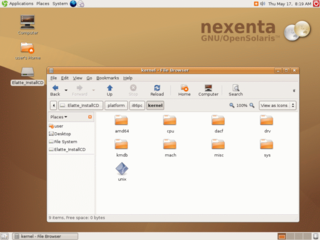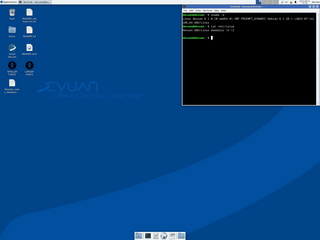
The Common Desktop Environment (CDE) is a desktop environment for Unix and OpenVMS, based on the Motif widget toolkit. It was part of the UNIX 98 Workstation Product Standard, and was for a long time the Unix desktop associated with commercial Unix workstations. It helped to influence early implementations of successor projects such as KDE and GNOME, which largely replaced CDE following the turn of the century.

GNU is an extensive collection of free software, which can be used as an operating system or can be used in parts with other operating systems. The use of the completed GNU tools led to the family of operating systems popularly known as Linux. Most of GNU is licensed under the GNU Project's own General Public License (GPL).

A Linux distribution is an operating system that includes the Linux kernel for its kernel functionality. Although the name does not imply product distribution per se, a distro, if distributed on its own, is often obtained via a website intended specifically for the purpose. Distros have been designed for a wide variety of systems ranging from personal computers to servers and from embedded devices to supercomputers.

Oracle Solaris is a proprietary Unix operating system offered by Oracle for SPARC and x86-64 based workstations and servers. Originally developed by Sun Microsystems as Solaris, it superseded the company's earlier SunOS in 1993 and became known for its scalability, especially on SPARC systems, and for originating many innovative features such as DTrace, ZFS and Time Slider. After the Sun acquisition by Oracle in 2010, it was renamed Oracle Solaris.

Advanced Package Tool (APT) is a free-software user interface that works with core libraries to handle the installation and removal of software on Debian and Debian-based Linux distributions. APT simplifies the process of managing software on Unix-like computer systems by automating the retrieval, configuration and installation of software packages, either from precompiled files or by compiling source code.
dpkg is the software at the base of the package management system in the free operating system Debian and its numerous derivatives. dpkg is used to install, remove, and provide information about .deb packages.
deb is the format, as well as filename extension of the software package format for the Debian Linux distribution and its derivatives.

pkgsrc is a package management system for Unix-like operating systems. It was forked from the FreeBSD ports collection in 1997 as the primary package management system for NetBSD. Since then it has evolved independently; in 1999, support for Solaris was added, followed by support for other operating systems.

OpenSolaris is a discontinued open-source computer operating system for SPARC and x86 based systems, created by Sun Microsystems and based on Solaris. Its development began in the mid 2000s and ended in 2010.
gtkmm is the official C++ interface for the popular GUI library GTK. gtkmm is free software distributed under the GNU Lesser General Public License (LGPL).

Nexenta OS, officially known as the Nexenta Core Platform, is a discontinued computer operating system based on the OpenSolaris kernel and Ubuntu user space that runs on IA-32- and x86-64-based systems. It emerged in fall 2005, after Sun Microsystems started the OpenSolaris project in June of that year. Nexenta Systems, Inc. initiated the project and sponsored its development. Nexenta OS version 1.0 was released in February 2008.

Kernel-based Virtual Machine (KVM) is a free and open-source virtualization module in the Linux kernel that allows the kernel to function as a hypervisor. It was merged into the mainline Linux kernel in version 2.6.20, which was released on February 5, 2007. KVM requires a processor with hardware virtualization extensions, such as Intel VT or AMD-V. KVM has also been ported to other operating systems such as FreeBSD and illumos in the form of loadable kernel modules.
GNU variants are operating systems based upon the GNU operating system. According to the GNU project and others, these also include most operating systems using the Linux kernel and a few others using BSD-based kernels.
This is a comparison of notable free and open-source configuration management software, suitable for tasks like server configuration, orchestration and infrastructure as code typically performed by a system administrator.

MonoDevelop is a discontinued open-source integrated development environment for Linux, macOS, and Windows. Its primary focus is development of projects that use Mono and .NET Framework. MonoDevelop integrates features similar to those of NetBeans and Microsoft Visual Studio, such as automatic code completion, source control, a graphical user interface (GUI), and Web designer. MonoDevelop integrates a Gtk# GUI designer called Stetic. It supports Boo, C, C++, C#, CIL, D, F#, Java, Oxygene, Vala, JavaScript, TypeScript, and Visual Basic.NET. Although there is no word from the developers that it has been discontinued, nonetheless, it hasn't been updated in 4 years and is no longer installable on major operating systems, such as Ubuntu 22.04 and above.

RPM Package Manager (RPM) is a free and open-source package management system. The name RPM refers to the .rpm file format and the package manager program itself. RPM was intended primarily for Linux distributions; the file format is the baseline package format of the Linux Standard Base.

Illumos is a partly free and open-source Unix operating system. It has been developed since 2010 and is based on OpenSolaris, after the discontinuation of that product by Oracle. It comprises a kernel, device drivers, system libraries, and utility software for system administration. Its core has become the base for many different open-sourced Illumos distributions, in a way similar to how the Linux kernel is used in different Linux distributions.

OpenIndiana is a free and open-source illumos distribution compatible with SPARC and x86-64 based computers. The project began in 2010, forked from OpenSolaris after OpenSolaris was discontinued by Oracle Corporation, and is hence descended from UNIX System V Release 4.

Devuan is an open source, Debian-based Linux distribution that aims to maintain compatibility with other init systems and avoid lock-in by systemd. Devuan offers sysvinit, runit or OpenRC as alternatives to systemd.














